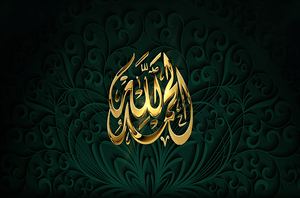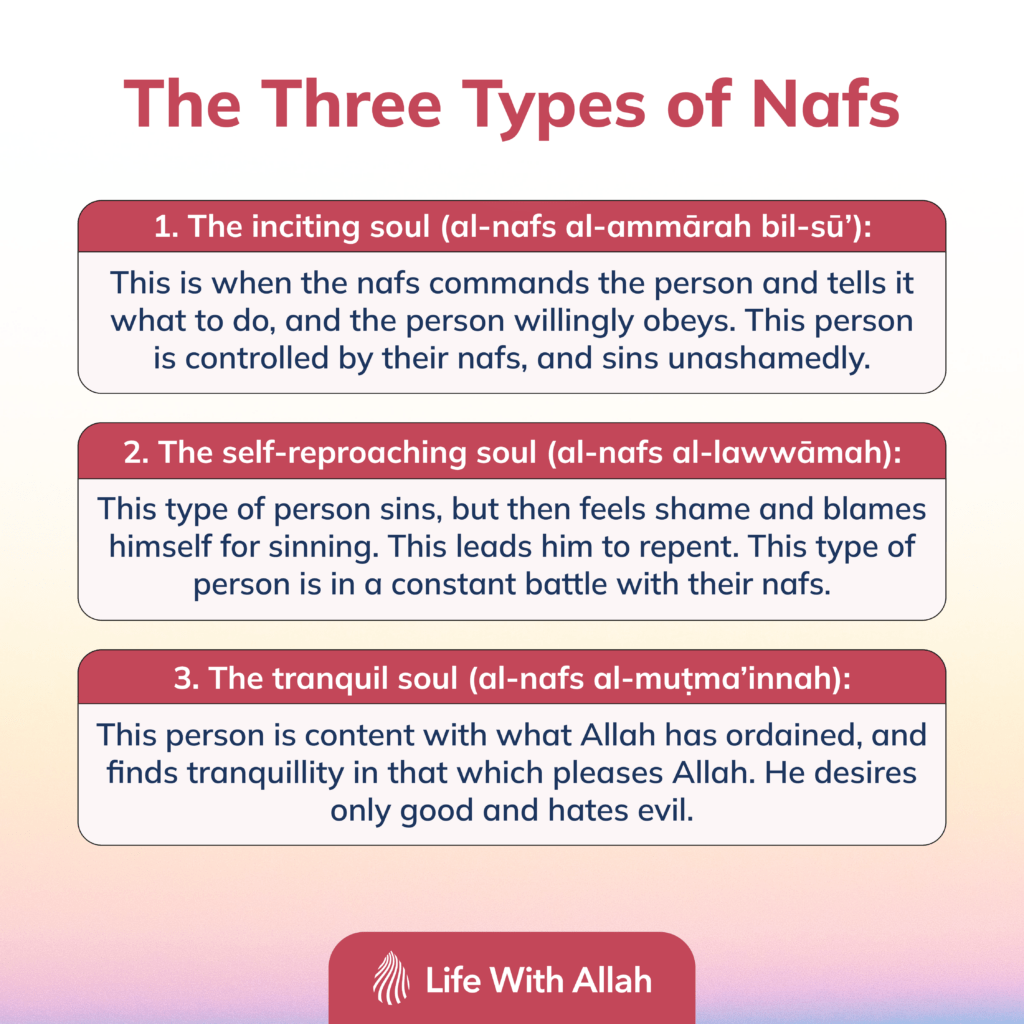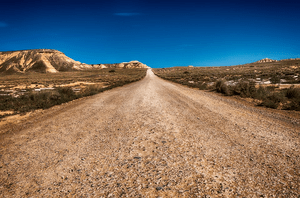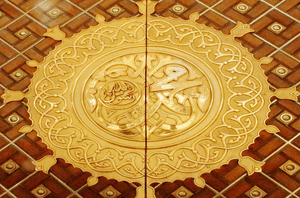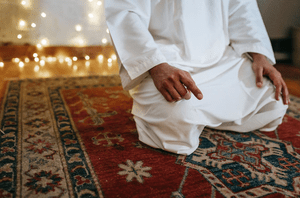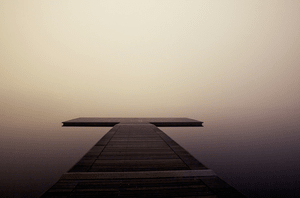You will now proceed on to say Allāhu Akbar and fall into prostration. Sujūd is the secret of ṣalāh and its greatest pillar. Ibn al-Qayyim (raḥimahullāh) stated that all the actions before this great deed were just preludes to it.
Every preparation you make before ṣalāh is for this meeting point with Allah (ʿazza wa jall). Sujūd is the closest you can be to Allah (ʿazza wa jall), despite your weaknesses and many sins. Sujūd is a unique and special meeting point with Allah (ʿazza wa jall). When you are in sajdah, peeping at someone or something becomes very difficult. When in sajdah, you lower your entire body, your face and ultimately your heart. You submit to Him, glorify Him and pour out your heart to Him. There is no greater manifestation of your servitude to Him than this great act.
Furthermore, Allah (ʿazza wa jall) has dignified sujūd by making its effect manifest on the face, the most noble part of the human body. Allah (ʿazza wa jall) says, “…Their distinguishing feature – as a result of prostration – is on their faces” (48:29).
According to some scholars, this āyah signifies the brightness and radiance of their faces on the Day of Judgement. Others says it refers to khushūʿ, humility and outstanding character as a result of their sujūd.
On the Day of Judgement, the Prophet ﷺ will recognise his ummah from their shining faces. Their faces will be radiant as a result of their sujūd in this world. The more sujūd you perform in this world, the more radiant your face will be in the hereafter and the quicker you will be identified by the Prophet ﷺ.
Allah (ʿazza wa jall) has made the Hell-fire ḥarām for the face which prostrates itself to Him. The Messenger of Allah ﷺ said, “Hell-fire will consume all of the son of Ādam except the mark of prostration. Allah has forbidden the Fire to consume the mark of prostration” (Ibn Mājah).
The 7 Objectives of Sujūd
1. Humility and showing your absolute need
In sujūd you are rubbing your face (the noblest part of your body) onto the ground, and thereby completely humbling yourself to Allah. Therefore, show Allah (ʿazza wa jall) your absolute need for Him. Go to Him completely and broken. Think of how weak and helpless you are.
Ensure there is no barrier between the ground and your face. The Prophet ﷺ purposely rubbed his blessed face in the mud, demonstrating the extent to which he humbled himself in front of Allah (ʿazza wa jall).
Prostrating on the earth acts as a reminder of your humble origins and the place of your ultimate return: the grave. People walk and trample on the earth, yet this is the same substance you have been created from. As you lower your face,lower your ego and place it onto the ground. Purify yourself from pride and humble yourself to the Most Magnificent.
There is no slave who offers even one sajdah for the sake of Allah on any portion of the earth, except that it will testify for him on the Day of Judgement and will cry for him the day he dies.” – ʿAṭā’ al-Khurāsānī (raḥimahullāh)
Let each part of your body humble itself for Allah (ʿazza wa jall) and show its servitude (ʿubudiyyah) to Him. Not only should your face be lowered and humbled, but so should your hands, knees and feet. Lift your stomach from your thighs and your arms from the sides of your body. Ensure your arms are not spread out on the floor. Let each part of your body physically demonstrate its servitude to its Master and do not let them be dependent on each other. Ibn al-Qayyim (raḥimahullāh) explained that in sajdah, the lower body ends up at a higher level than the upper body, and this emphasises the submission of the slave. In this broken and lowly state, the slave glorifies and magnifies Allah (ʿazza wa jall).
The secret of the prostration is the prostration of the heart. Thus, it is vital that just as your body performs sajdah, your heart should also perform sajdah. One of the predecessors was asked, “Can the heart prostrate too?” He replied, “By Allah, of course! A prostration from which he does not raise his head, until he meets Allah.”
Reflect
The need, desperation and humility you feel in sujūd and in front of Allah (ʿazza wa jall) should extend beyond your ṣalāh. You will only have internalised servitude (your ultimate purpose in life) when you think entirely of yourself as nothing, and desperately turn to Him for everything. Not only will you rely solely on Him, but you will also strive to please Him and abstain from disobeying Him. Similarly, this humility should prevent you from looking down on others and remove every trace of pride from your heart.
2. Closeness
Savour the sweetness of being close to Allah al-Qarīb (The Ever-Near) in sujūd. The Messenger of Allah ﷺ said, “The closest a slave is to his Lord is when he is prostrating” (Muslim).
Allah (ʿazza wa jall) instructed His beloved ﷺ, “…Prostrate and draw near (to Allah)” (96:19).
The longer your sajdah, the greater your chance of enjoying Allah’s close intimacy. In this world, we seek closeness with those whom we love since we derive peace and tranquillity in their company. With Allah (ʿazza wa jall), there is even more peace and tranquillity if we sincerely seek His closeness. To truly feel the sweetness of ṣalāh, you have to feel the sweetness of sujūd.
3. Duʿā’
Sujūd is one of the best times to make duʿā’. Pour your heart out to Allah (ʿazza wa jall) in this time, and cry out of fear of Him. The Messenger of Allah ﷺ said, “As for sujūd, go to great lengths in making duʿā’ in it, as it is likely that your duʿā’ shall be answered” (Muslim)
Make duʿā’ for everything, be it minor or major. (See our publication ‘I Am Near’ for a detailed guide on how to make duʿā’). Be selfless and make duʿā’ for your family, friends and the ummah. Be like Abu al-Dardā’ (raḍiy Allāhu ʿanhu) who said, “Indeed I make duʿā’ for thirty of my brothers whilst I am in sujūd, with their names and their fathers’ names.”
Have conviction that Allah (ʿazza wa jall) will accept your duʿā’. Sufyān b. ʿUyaynah (raḥimahullāh) said, “Whatever (evil) you know about yourself should not prevent you from making duʿā’, because Allah accepted the duʿā’ of the worst of Allah’s creation. Iblīs – may he be cursed – said, ‘My Lord, give me respite until the Day when they are resurrected.’ (Allah) said, ‘You are of those given respite.’”
Reflect
Five times a day I will knock at the door of Allah (ʿazza wa jall) and go to Him with my problems, worries and needs. The longer I spend in conversation with Him, the more at ease my heart feels. I feel lighter and I feel calmness enveloping me. I also remember my loved ones and I make duʿā’ for all those suffering in the ummah.
4. Sins being forgiven
Visualise your sins being perched on top of your shoulders as you are in sujūd. The greater your khushūʿ, the more you will cry. The more sincere you are in your crying, the faster your sins will fall off your shoulders, like leaves off a tree.
The Messenger of Allah ﷺ said, “When the slave stands to pray, all of his sins are brought and placed on his head and shoulders. Whenever he bows or prostrates, they fall off him” (Ṭabarānī).
The greater your sins, the lengthier you should stay in sujūd. By the will of Allah (ʿazza wa jall), your tears will wash away the dirt accumulated on your heart due to your sins.
Maʿdān b. Ṭalḥah (raḥimahullāh) said, “I met Thawbān (raḍiy Allāhu ʿanhu), the freed slave of the Messenger of Allah ﷺ. So, I asked him, ‘Inform me of a deed through which Allah will grant me good and admit me into Paradise.’ He remained silent for quite a while. He then turned to me and said, ‘Hold on to sujūd, for indeed I heard the Messenger of Allah ﷺ say: There is no slave who performs a sajdah except that Allah raises him a level through it, and wipes away a sin from him through it’” (Tirmidhī).
5. Be with the Prophet ﷺ in the highest heaven
Rabīʿah b. Kaʿb (raḍiy Allāhu ʿanhu) would spend the night in the service of the Prophet ﷺ and bring him water for his purification and wuḍū’. Once, the Prophet ﷺ said to him, “Ask!” Rabīʿah said, “I ask you for your company in Paradise.” When the Prophet ﷺ asked him if he would like anything else, he replied, “Only that.” The Prophet ﷺ then told him, “Then help me to achieve this for you through abundant sujūd” (Muslim).
Perform additional voluntary prayers and prostrations, and have the intention of being raised to the highest heaven so that you can be in the company of the Prophet ﷺ.
If you saw Ḥabīb b. Abī Thābit, you would think that he has died (due to his long prostration).”- Abū Bakr b. ʿAyyāsh (raḥimahullāh)
6. Feel happy about overcoming your enemy
Feel happy that you have overcome your greatest enemy, Shayṭan who detests that you fall into prostration to your Lord. Visualise him crying in the corner of your room, saying, “Woe to me! The son of Ādam was commanded to prostrate, and he prostrated so for him is Paradise. I was commanded to prostrate, and I refused so for me is Hell-fire” (Muslim).
7. Feel a sense of self-honour
Feel honoured that you only bow your head to Allah (ʿazza wa jall) and to none of His creation. You are only relying on Him and it is Him (ʿazza wa jall) Alone that you ask for help. Be like Imām Aḥmad (raḥimahullāh) who said, “O Allah, as you have protected my face from prostrating to other than You, then protect it from asking anyone other than You.”
I saw Sufyān al-Thawrī in sajdah. I went around the Kaʿbah seven times before he raised his head.” – ʿAlī b. Fuḍayl (raḥimahullāh)
The Adhkar of Sujud
It was the practice of the Prophet ﷺ to lengthen his sujūd. He said, “When one of you prays, he should complete his rukūʿ and he should not peck in his ṣujūd, for the example of this is like the hungry person who consumes one or two dates. What use will they be for him?” (Ṭabarānī). He ﷺ also said, “The ṣalāh of a person will not suffice unless he straightens his back in rukūʿ and sujūd” (Abū Dāwūd).
One way of lengthening your sujūd is by memorising and supplicating (especially in your nafl prayers) with the following sunnah adhkār:
1. x3 سُبْحَانَ رَبِّـيَ الْأَعْلَىٰ
How Perfect is my Lord, the Most High.
When you are in sujūd, you are at your lowest having placed your face on the ground. Therefore, it is most apt that you proclaim His greatness, along with affirming His (ʿazza wa jall) perfection above anything which does not befit His (ʿazza wa jall) greatness and grandeur.
2. سُبُّوْحٌ قُدُّوْسٌ، رَبُّ الْمَلَائِكَةِ وَالرُّوْحِ
The Supremely Perfect, The Most Pure, The Lord of the Angels and the Spirit (Jibrīl).
3. سُبْحَانَكَ اللّٰهُمَّ رَبَّنَا وبِحَمْدِكَ ، اَللّٰهُمَّ اغْفِرْ لِيْ
How Perfect are You, Allah our Lord, and for You is all praise. O Allah, forgive me.
4. سُبْحَانَكَ وَبِحَمْدِكَ ، لَا إِلٰهَ إِلَّا أَنْتَ
You are free from imperfection, and all praise is to You. There is no god worthy of worship except You.
5. اَللّٰهُمَّ لَكَ سَجَدْتُ ، وَبِكَ اٰمَنْتُ ، وَلَكَ أَسْلَمْتُ ، سَجَدَ وَجْهِيْ لِلَّذِيْ خَلَقَهُ وَصَوَّرَهُ وَشَقَّ سَمْعَهُ وَبَصَرَهُ ، تَبَارَكَ اللّٰهُ أَحْسَنُ الْخَالِقِيْنَ
O Allah, for You Alone I have prostrated, in You Alone I have believed, and to You Alone I have submitted. My face has prostrated to the One who created and fashioned it, and who formed its hearing and sight. Blessed is Allah, the Best of Creators.
Whilst reading this duʿā’, feel a sense of shame and shyness from the One who granted you all of the aforementioned blessings; and yet you still disobey Him. Imagine you were blind and Allah (ʿazza wa jall) had not bestowed you with the gift of sight. Imagine you were deaf and you could not hear your loved ones or the recitation of the Qur’ān.
6. سُبْحَانَ ذِي الْجَبَرُوْتِ ، وَالْمَلَكُوْتِ ، وَالْكِبْرِيَاءِ ، وَالْعَظَمَةِ
How perfect is the Owner of might, dominion, grandeur and greatness.
7. اَللّٰهُمَّ اغْفِرْ لِيْ ذَنْبِيْ كُلَّهُ ، دِقَّهُ وَجِلَّهُ ، وَأَوَّلَهُ وَآخِرَهُ ، وَعَلَانِيَتَهُ وَسِرَّهُ
O Allah, forgive for me all of my sins: the minor and major, the first and the last, the public and the private.
8. اَللّٰهُمَّ إِنّيْ أَعُوْذُ بِرِضَاكَ مِنْ سَخَطِكَ ، وَبِمُعَافَاتِكَ مِنْ عُقُوْبَتِكَ ، وَبِكَ مِنْكَ ، لَا أُحْصِيْ ثَنَاءً عَلَيْكَ ، أَنْتَ كَمَا أَثْنَيْتَ عَلَىٰ نَفْسِكَ
O Allah, indeed, I seek protection in Your pleasure from Your anger, and in Your forgiveness from Your punishment, and in You from Your [aforementioned anger and punishment]. I cannot enumerate Your praise. You are as You have praised Yourself.
ʿĀ’ishah (raḍiy Allāhu ʿanhā) said, “One night, I noticed that the Messenger of Allah ﷺ was missing. I found him (in the Masjid), in prostration with his feet upright; he was saying [the above]” (Nasā’ī).
ʿAbdul-Aʿlā al-Taymī (raḥimahullāh) used to say in his sujūd, “My Lord, increase me in my khushūʿ of You, as Your enemies increase in their aversion to You. And do not throw us into the Hell-fire upon our faces after they have prostrated to You.”
The optimum time for duʿā’
Whilst in sujūd, you can make any duʿās you wish to; you are not limited to the above duʿās. The Messenger of Allah ﷺ said, “The closest a slave is to his Lord is when he is prostrating, so make plenty of duʿā’” (Muslim). Therefore, you should make as much duʿā’ as you can in your sajdah, especially in your voluntary prayers. It is best to supplicate with the duʿās from the Qur’ān and Sunnah. (For a list of these supplications, along with the translation, see our publication ‘I Am Near’).
Muslim b. Yasār (raḥimahullāh) used to say in his sujūd, “When will I meet You and You are happy with me?”. He would continue making duʿā’, and then say, “When will I meet You and You are happy with me?”

